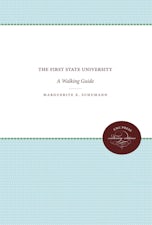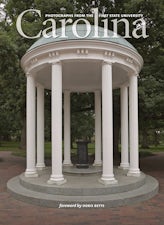Print News and Raise Hell
The Daily Tar Heel and the Evolution of a Modern University
By Kenneth Joel Zogry
360 pp., 8 x 10, 130 halftones, notes, index
-
Paperback ISBN: 978-1-4696-6922-9
Published: February 2022 -
Hardcover ISBN: 978-1-4696-0829-7
Published: February 2018 -
E-book EPUB ISBN: 978-1-4696-0830-3
Published: February 2018 -
E-book PDF ISBN: 979-8-8908-4402-6
Published: February 2018
Buy this Book
- Paperback $35.00
- Hardcover $39.95
- E-Book $29.99
For Professors:
Free E-Exam Copies
About the Author
Kenneth Joel Zogry, Ph.D., is a public historian and researches and writes extensively about UNC history.
For more information about Kenneth Joel Zogry, visit
the
Author
Page.
Reviews
“Informative and accessible, Zogry’s work confirms that a free, independent press remains crucial to the healthy functioning of society and essential to understandings of the present and the past.”--Journal of Southern History
“Kenneth Joel Zogry's history of the University of North Carolina's student newspaper the Daily Tar Heel (DTH) is proof that news really is the 'first rough draft of history.' His sweeping, sprawling story-by-story account of the paper's 125-plus years of publication gives the sort of unvarnished context so necessary, but so often missing, from histories of higher education.”--Journal of American History
“A surprisingly lively and engaging survey of hundreds of thousands of articles printed in some twenty thousand issues of the University of North Carolina’s (UNC) student newspaper, the Daily Tar Heel. . . . [Zogry] has given us an invaluable perspective on the period when UNC-Chapel Hill grew and developed into one of America’s premier public research universities.”--North Carolina Historical Review
"Ken Zogry's history of the Daily Tar Heel tells two engaging and interlocking stories--not only of a legendary student newspaper, but of the university whose adventures it fearlessly chronicles. It is eloquent and essential reading for us all."--Edwin M. Yoder Jr., Pulitzer Prize-winning journalist and author of Lions at Lamb House
"This is not merely a history of the Daily Tar Heel; it is a history of the key battles that were fought over complex issues that faced the university and the state of North Carolina itself during much of the twentieth century and the early years of the twenty-first--issues that vex us yet."--Jack Betts, retired associate editor, the Charlotte Observer
"This is historical writing at its best--trenchant, lively, and engaging. Zogry reminds us that students, no less than faculty and administrators, have shaped the history of America's colleges and universities. At UNC, they often led in making the institution a refuge for open inquiry and free expression in a region that too often had little tolerance for either."--James L. Leloudis, author of To Right These Wrongs



